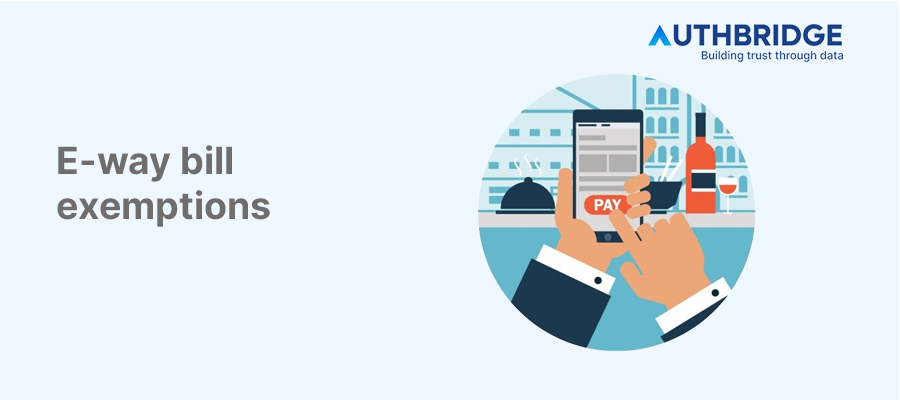The Impact Of E-Way Bills On Logistics: Transforming Transportation And Supply Chain Efficiency

Understanding E-Way Bills
The e-way bill is a digital document required for the transportation of goods in India, where the value exceeds INR 50,000. It's part of the GST regime to ensure tax compliance and track goods movement.
The Need for Exemptions
Despite its broad application, the e-way bill system incorporates exemptions to simplify logistics for specific goods and scenarios, reducing the compliance burden on businesses, especially SMEs and sectors dealing with essential commodities or non-commercial transactions.
Categories of Exempted Goods
List of Exempted Goods
The GST council has identified categories of goods exempt from the e-way bill requirement to facilitate easy movement and reduce the compliance load on certain sectors.
Table 1: Exempted Goods from E-Way Bill Requirement
Category | Examples |
Essential Commodities | LPG, kerosene oil (PDS), food grains |
Precious Items | Jewellery, currency, precious metals |
Personal Effects | Used personal and household effects |
Specific Goods | Live animals, unprocessed tea leaves, raw silk |
Specific Exemptions Based on Goods Type
Certain goods, due to their nature or the necessity for immediate transport, are exempt from e-way bill requirements to ensure their quick and unhindered movement.
Transactions Exempt from E-Way Bills
Value-Based Exemptions
Transactions involving goods valued less than INR 50,000 are exempt from the e-way bill, simplifying small-scale movements and reducing paperwork for small businesses.
Mode of Transport and Specific Circumstances
Goods transported by non-motorized conveyance and certain specified conditions, such as goods moved within a specified area or for customs clearance, are exempt, acknowledging the practical aspects of goods movement.
Table 2: Transactions Exempt from E-Way Bill
Scenario | Description |
Non-motorized Transport | Goods moved via manual carts, animal-driven vehicles |
Customs and Security | Goods moved under customs supervision or seal |
Specified Areas | Goods transported within designated areas or for specific purposes like weighbridge verification |
Documentation for Exempted Goods and Transactions
Required Documents in Absence of E-Way Bill
Even in exempt scenarios, carriers must possess certain documents, such as tax invoices or delivery challans, ensuring transparency and compliance during transport.
Compliance for Exempted Categories
Businesses dealing with exempted goods or transactions must maintain accurate records and documentation to substantiate the exemption in case of scrutiny or verification.
Impact of Exemptions on Businesses
Simplification of Transport for Specific Goods
Exemptions play a crucial role in simplifying logistics for businesses dealing with exempted goods, reducing the time and resources spent on compliance.
Regulatory Compliance and Record-Keeping
While exemptions reduce the compliance burden, businesses must still adhere to regulatory requirements, maintaining proper records and documents for all transactions, exempt or otherwise.
Documentation for Exempted Goods and Transactions
Required Documents in Absence of E-Way Bill
For movements exempt from the e-way bill requirement, carriers must still carry certain documents to ensure compliance and facilitate verification by authorities.
Table 3: Required Documents for Exempted Goods Movement
Document Type | Purpose |
Tax Invoice or Bill of Supply | To prove the value and nature of goods being transported. |
Delivery Challan | For movements not covered by a tax invoice or for services. |
Copy of the Order | In case of government orders or special permissions. |
These documents ensure that, even in the absence of an e-way bill, there is transparency in the movement of goods and that the transport can be justified as compliant with GST regulations.
Compliance for Exempted Categories
Businesses dealing with exempted goods or transactions must maintain meticulous records of such movements. This includes keeping copies of invoices, challans, and any other relevant documentation for a period specified by the GST laws.
Impact of Exemptions on Businesses
Simplification of Transport for Specific Goods
E-way bill exemptions significantly simplify the process of transporting certain goods. This is particularly beneficial for sectors dealing with perishable items, essential commodities, or items of high value, where time and security are of the essence.
Table 4: Benefits of E-Way Bill Exemptions for Businesses
Benefit | Description |
Reduced Compliance | Less paperwork and lower compliance costs. |
Faster Movement | Quicker transportation without the need for e-way bill generation and verification. |
Simplified Logistics | Easier logistics planning and execution for exempted goods. |
Regulatory Compliance and Record-Keeping
While exemptions provide relief from generating e-way bills, they do not absolve businesses from other GST compliance requirements. Accurate and timely record-keeping is essential to prove the legitimacy of the exempted movement during audits or inspections.
Table 5: Compliance Checklist for Exempted Goods Movement
Compliance Requirement | Description |
Record-Keeping | Maintain detailed records of exempted goods movement for at least 6 years. |
Documentation | Keep copies of all relevant documents, including invoices and delivery challans. |
Reporting | Report exempted transactions as required under GST returns or as per specific state regulations. |
Conclusion
Understanding the nuances of e-way bill exemptions is crucial for businesses to navigate the GST framework effectively. While these exemptions simplify logistics and reduce the compliance burden for specific goods and transactions, they also necessitate diligent record-keeping and documentation to ensure compliance. Businesses must stay informed about the latest updates and guidelines related to e-way bill exemptions to leverage these benefits fully while maintaining regulatory compliance.
Category

Abhinandan Banerjee
(Associate Manager - Marketing)
Abhinandan is a dynamic Product and Content Marketer, boasting over seven years of experience in crafting impactful marketing strategies across diverse environments. Known for his strategic insights, he propels digital growth and boosts brand visibility by transforming complex ideas into compelling content that inspires action.



